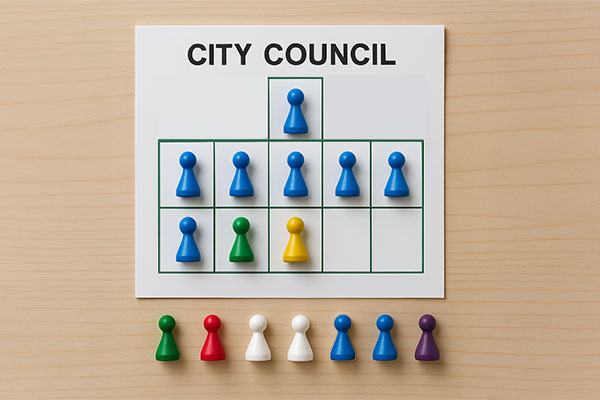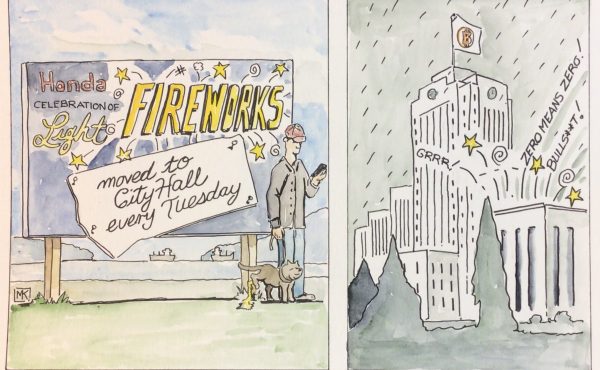
With Vancouver’s by-election behind us, the post-mortems have begun—and this one might be more fun than most. One thing was clear: voters wanted to send ABC a message. Throughout the campaign, I had countless conversations with friends, family, and acquaintances about their voting intentions. Now that the results are in, a couple of questions linger:
Can we evaluate the outcome of voters’ decisions? Can we determine whether we got it “right” or “wrong”?
Most would balk at the idea. But few things delight me more than a good statistical puzzle and a little light political game theory. So, join me in a playful exercise I’m calling The Retroactive By-Election Game.
The Context
In a city where ABC controls seven of eleven council seats—and votes together with machine-like consistency—politics can feel less like a debate and more like a rubber stamp. Add in two more councillors who mostly align with ABC, and Council rarely strays from the script. There’s little suspense about how most votes will go. Just the rhythm of consensus.
But this spring, two council seats opened up. And while that wasn’t enough to shift control, it did offer a chance to reshape what that control looks like. These seats became the site of a quieter political battle—not for power, but to challenge it. Voters frustrated by a lack of diverse perspectives wanted to send a message. The question became: how?
The Game
To understand what was at stake, let’s lay out the council like a board game. Using the CityHallWatch Scorecard as a proxy for overall alignment, we can sketch each group’s voting patterns based on past performance.
Rules of the Game:
- 11 council seats total
- 2 seats up for grabs
- ABC (7 seats): votes in 100% agreement
- Independent (1 seat): agrees with ABC 6 out of 7 times
- Green (1 seat): agrees with ABC 5 out of 7 times, with one wildcard issue
Under ABC, council hasn’t just been majoritarian—it’s been monotonous. Their voting unity and soft-aligned allies leave little room for dissent. Two new seats won’t flip the balance, but they might introduce a subplot.
Meet the Candidates
Five alternatives ran against ABC’s two loyalists. Their estimated alignment with ABC is based on the CityHallWatch Scorecard and broader political positioning:
- Green: 5/7 agreement, 1 unknown
- OneCity: 6/7 agreement
- COPE: 3/7 agreement, 2 unknown, 2 firm disagreements
- TEAM (2 candidates): 0/7 agreement—complete opposition, one with four years of prior council experience
If voters wanted to disrupt the ABC bloc, they likely looked beyond ABC’s own slate. But that raised the tougher question: what kind of disruption did they want?
Scenarios in Strategy
Let’s play it out. Depending on which two candidates were elected, the results could range from symbolic protest to strategic interference. Here are five plausible scenarios:
Scenario A: TEAM + TEAM (experienced)
Two full-throated dissenters.
Alignment with ABC: 0%
-
- Pros: Sends the clearest message of discontent
- Cons: Risks of being dismissed as combative or fringe
- Influence: Minimal—loud, but easily ignored
Scenario B: TEAM (experienced) + COPE
A mix of principled opposition and unpredictable challenge
Alignment with ABC: ~30%
-
- Pros: Tactical flexibility; potential for surprise coalitions
- Cons: May frustrate voters looking for ideological purity
- Influence: High potential for disruption and debate
Scenario C: TEAM (experienced) + Green
Opposition with a side of moderation
Alignment with ABC: ~35%
-
- Pros: Broader appeal across the political spectrum
- Cons: Green likely to vote with ABC on most issues
- Influence: Somewhat limited
Scenario D: Green + OneCity
Soft allies of ABC
Alignment with ABC: ~80%
-
- Pros: Safe, palatable choices
- Cons: Undermines any intent to disrupt
- Influence: Reinforces the status quo
Scenario E: OneCity + COPE
Cautious alignment paired with volatility
Alignment with ABC: ~65%
-
- Pros: COPE shakes things up; OneCity keeps access
- Cons: OneCity may blunt COPE’s impact
- Influence: Mixed—could spark debate, or blend into consensus
Opposition as Strategy
In council politics, the ability to steer conversation often outweighs the ability to win votes. The TEAM candidate with council experience brings more than dissent—they bring procedural know-how. That knowledge can delay motions, force debate, or reframe issues—turning a powerless minority into a strategic force.
Pair them with someone like COPE, and you get more than just opposition—you get tension. The kind that demands answers, invites public scrutiny, and disrupts the rhythm of consensus.
This isn’t revolution. It’s redirection. Voters weren’t electing a majority—they were choosing the shape of resistance. Did they want a loud protest? Quiet challenge? A little of both? Ideological clarity or strategic mischief?
Two seats won’t change who holds power. But they might change how that power operates. And in a city growing restless with uniformity, that may be enough.
Lessons Learned
Sure, this is a speculative, geeky thought experiment—but it raises some valuable reflections. If the goal was to disrupt ABC’s monopoly, Scenario B—COPE and TEAM (experienced)—offered the sharpest strategic choice.
Instead, voters chose COPE and OneCity—a mix with potential, but a higher likelihood of aligning with ABC. Depending on how those parties behave, the message voters intended to send may resonate—or dissolve into quiet consensus.
Of course, voters don’t always cast ballots based on strategy. Some vote along party lines, some for individuals. Many rely on intuition, impression, or habit. Few have the time—or desire—to game out procedural leverage or vote-splitting.
Still, this kind of post-election puzzle invites some pressing questions:
- What does effective opposition look like in a supermajority?
- Is ideological clarity more valuable than strategic ambiguity?
- Can a minority ever really “win”—and what does winning mean?
- Does this outcome reveal a deeper issue: that many voters don’t understand how local governance works?
- If so, why do decisions that most directly affect our lives—on housing, infrastructure, zoning—receive the least scrutiny?
- What happens when civic discourse, education, and media coverage turn away from the city scale?
- How can voters send meaningful political messages if they don’t understand the system?
- Where does civic education fit in a world growing more complex?
These are weighty questions—and they deserve more space in post–by-election conversations. This wasn’t just about two seats. It was a test of how we define resistance inside a dominant system. And that question feels more urgent than ever.
Voters may have sent a message. But are those in power listening? Or, more provocatively: did voters send a clear message at all?
Maybe that’s Vancouver’s governance gap—not just the divide between power and people, but the silence in between.
***
Erick Villagomez is the Editor-in-Chief at Spacing Vancouver and teaches at UBC’s School of Community and Regional Planning. He is also the author of The Laws of Settlements: 54 Laws Underlying Settlements Across Scale and Culture.




